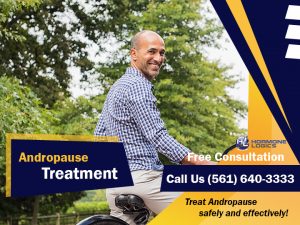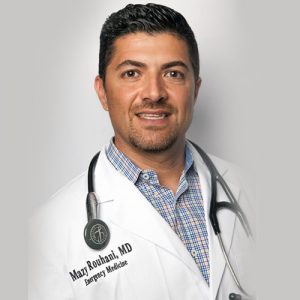Men With Low Testosterone Are at Greater Risk of Osteoporosis
Research has shown that men with low testosterone or andropause are at a greater risk of bone loss leading to osteoporosis.
When you think of hormones and age-related “bone loss,” you usually think of women.
That is because women — particularly post-menopausal women — are much more likely to suffer from osteoporosis than their male counterparts. However, men, too, can face weakening bones as they get older, and just as in women, declining hormones can be at the root of the problem.
In the case of men, it is low testosterone that could be causing a significant loss in bone density.
Testosterone and Bone Loss in Men
For men, there is not a sudden increase in the rate of bone loss at a given point in time, such as there is in post-menopausal women. However, there is gradual bone-thinning over time, which seems to correspond to the gradual loss of testosterone in men as they age.
Studies have found that men with low testosterone, even those under 50 years of age, are at increased risk of bone loss, thinning bones, and increased risk of osteoporosis-related bone fractures.
Again, while the incidence of osteoporosis in men is less than in women, the consensus among medical professionals and researchers is that the most common cause of male osteoporosis is age-related testosterone deficiency. Therefore, when we see any man who presents with osteoporosis, as physicians, we will immediately test for low testosterone.
What is the link between testosterone levels and healthy bones? Testosterone contributes to maintaining healthy bones in a number of ways. Bone is a living thing. Throughout your life, old layers of bone “slough off,” and new layers are replaced. Estrogen and minerals, such as vitamin D and calcium, are critical to this process.
While estrogen is thought of as a “female” hormone, it is still required for building strong bones in men. Men, however, do not “produce” estrogen; rather, a small amount of testosterone is converted to estrogen in men’s bodies, specifically for the purpose of bone replacement.
As testosterone levels drop, so does the amount available to convert to estrogen to prevent bone loss. Also, testosterone is a precursor to vitamin D, and men with low testosterone almost always also have a vitamin D deficiency, which also contributes to bone loss.
Testosterone is also necessary to build muscle; strong muscle helps to maintain strong and healthy bones. And finally, lack of exercise and obesity both contribute to weakening bones. Men with low testosterone can have a lack of energy and motivation and therefore tend to exercise less and be overweight.
The good news is that testosterone replacement therapy can strengthen bones as well as provide a wealth of other benefits for men with low testosterone.
What Are the Benefits of Testosterone Replacement Therapy?
Besides reducing your risk of osteoporosis, here are some of the many other benefits that hundreds of patients are experiencing from testosterone replacement at our West Palm Beach, Florida-based hormone clinics right now.
A 2009 study concluded that “Restoring testosterone levels to within the normal range by using testosterone replacement therapy can improve many of the effects of [low testosterone].
Most importantly, these include beneficial effects on mood, energy levels, patients’ sense of well-being, sexual function, lean body mass, muscle strength, bone mineral density (BMD), cognition, and some benefits on cardiovascular risk factors.”
In addition, testosterone replacement therapy has been shown to provide:
- Improved skin and hair health
- Increased strength and vitality
- Weight loss
- Improved heart health
- Stronger bones
- Improved sleep
The Best Treatments for Age-Related Hormone Decline
 You deserve to enjoy an active and healthy lifestyle at any age! But, unfortunately, as men and women age, your levels of critical hormones like testosterone drop, which harm your ability to enjoy life.
You deserve to enjoy an active and healthy lifestyle at any age! But, unfortunately, as men and women age, your levels of critical hormones like testosterone drop, which harm your ability to enjoy life.
Hormone replacement therapy, or HRT, is the key to getting back what time and nature take away. Hormone Logics has been successfully treating patients with age-related hormone loss with our unique hormone replacement therapies for men and women for many years.
Medical research has shown that testosterone replacement and/or HGH replacement therapy are extremely effective ways to treat age-related hormone decline. Hormone Logics’ HRT treatments for men and women have been proven to offer individuals between the ages of 35 and 65 a greatly improved quality of life.
Our medical director is Mazyar Rouhani, MD. Dr. Rouhani has long been a medical innovator. He is a co-founder of Symptify, an online symptom checker to better educate patients about their conditions. Recently, Dr. Rouhani has focused his endeavors on improving patients’ health using IV fluid hydration.
Using his medical expertise combined with his passion for optimizing each individual’s health and vitality, Dr. Rouhani combines his knowledge and expertise to provide the integrated approach to antiaging medicine to help his patients look and feel their best.
“I am over 40. I have been working out for years, and lately, I have cut out all the pizza and other junk from my diet, but I still wasn’t seeing the results I wanted. On top of that, I wasn’t sleeping well, had low energy, and generally just felt older than I am. I reached out to Hormone Logics after reading one of their blogs about the symptoms of low testosterone. After being tested and diagnosed with Low-T, I started testosterone replacement therapy, and within the first month, I saw a noticeable difference. I was sleeping much better, had tons of energy, and my gym workouts were more aggressive. In general, I just felt younger.”
Steve W., West Palm Beach, FL
If you would like to learn a little bit more about the many life-changing benefits of andropause therapy, please contact us today by calling (561) 640-3333.









